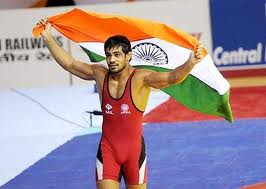 New Delhi, July 16: Beijing Olympic bronze medallist Sushil Kumar will be India's flag-bearer during the opening ceremony of the London Games, the Indian Olympic Association (IOA) announced on Sunday.
New Delhi, July 16: Beijing Olympic bronze medallist Sushil Kumar will be India's flag-bearer during the opening ceremony of the London Games, the Indian Olympic Association (IOA) announced on Sunday.
Sushil, one of the stars of India's history-making Olympics four years ago, will lead the strong Indian contingent that will hope to better the three-medal haul of Beijing.
The 66-kg wrestler, who would be competing in his third Games, was among the four Olympic medal winning sportspersons chosen for the role. Others were Beijing Olympics medal winners-- gold-medallist shooter Abhinav Bindra and bronze-medallist boxer Vijender Singh and tennis's doubles exponent Leander Paes, a bronze medallist at the 1996 Atlanta Olympics.
“It's a proud moment for me that such an honour has been bestowed upon me. I know there were other names considered as well. I feel privileged to have been chosen to lead the Indian contingent,” said a delighted Sushil.
The IOA was keen on having Bindra doing the honours but the shooter had reportedly conveyed his reluctance with his 10m air-rifle event scheduled two days after the opening ceremony on July 30. Likewise, Vijender's competition begins the very next day, scheduled for July 28.
With Paes having done the honours at the Sydney Games in 2000, Sushil was chosen for the role.
"With Abhinav Bindra and Vijender Singh having their events soon after the opening ceremony and Leander Paes already donning the role in Sydney Olympics, we have chosen Sushil Kumar to be the flag-bearer of the Indian contingent for the London Games," IOA acting president VK Malhotra told reporters on the sidelines of a send-off function by the ONGC.
However, it will not be easy for Sushil either as the wrestlers will be training in Belarus from July 20th to August 5. Indian wrestlers' competition will begin only on August 10 and the team will only reach a few days before their event. Sushil, whose event is slated on August 12, will have to come specially to London for the opening ceremony.
“He will come for a day to London and will then return to his training at Belarus. The wrestler will be coming to London on August 6th. The IOA discussed the matter with us and we agreed. It is a good news for wrestling that Sushil is becoming the flag-bearer. It will encourage more youngsters to take up the sport,” Wrestling Federation of Indai (WFI) general-secretary Raj Singh told Deccan Herald.
Sushil too wasn’t worried about the cramped schedule. "I will be in Belarus with the wrestling team but will fly down to London for the opening ceremony,” he pointed out. “It’s just a 2-2.5 hours away by flight. It is because of the love and respect of the people that I have got this opportunity. It will only motivate me to do well. It is a big thing for us wrestlers and it will encourage a lot of youngsters.”
Sushil was also the World Champion in 2010, and a gold medallist at the Commonwealth Games in Delhi.





Comments
Add new comment